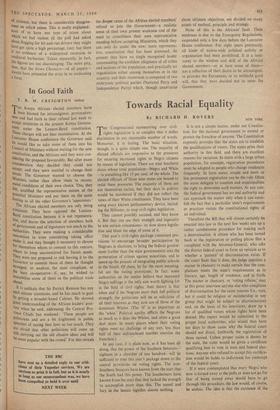In Good Faith
T• R. M. CREIGHTON writes:
THE Kenya African elected members have been blamed for intransigence, provocative- ness and bad faith in their refusal last week to accept ministries in the present Kenya Govern- ment under the Lennox-Boyd constitution. These charges will not bear examination. At the Lancaster House conference the Governor said he would like to take some of them into his Council of Ministers without waiting for the new constitution, and the Africans said they were con- sidering the proposal favourably. But after more consideration they decided they could not accept; and they were entitled to change their Minds. The Governor wanted to choose the Ministers rather than allow them to recom- mend
t, nd candidates of their own choice. This, they f qualified the representative nature of the
Potential Ministers and put them on the same f°°ting as all the other Governor's 'appointees.' The African elected members are only being consistent. They have opposed the Lennox- Boyd constitution because it is not representa- tive, and leaves the selection of members both of government and of legislature too much to the authorities. They were making a considerable emicession in even considering taking office tinder it, and they thought it necessary to choose for themselves whom to commit to this venture, Whom to keep uncommitted for future needs. They hey were not prepared to risk leaving it to the Governor to commit those of them he thought strongest, or weakest, the most compliant, or the least co-operative--if, say, he wished to Immobilise some of them in the political trials
ahead.
It is unlikely that Sir Patrick Renison has any such sinister intentions, and he has much to gain by getting a broader-based Cabinet. He showed great understanding of the African leaders' posi- tion when he said, addressing the Central Pro- vince Chiefs last weekend : 'These people are Politicians and are a bit frightened in public sPeeches of saying they love us too much. They are afraid that other politicians will come up still carrying out the old abusive ideas and Will be more popular with the crowd.' For this reveals the deeper cause of the African elected members' refusal to join the Government—a realistic sense of their own present weakness and of the need to consolidate their own representative standing before accepting Ministries, which they can only do under the new, more representa- tive, constitution that has been promised. At present they have no single recognised leader commanding the confident allegiance of all tribes and sections of the population, and practically no organisation either among themselves or in the country; and their movement is composed of two embryonic political parties (National Party and Independence Party) which, though unanimous
about ultimate objectives, are divided on many points of method, principle and strategy.
None of this is the Africans' fault. Their weakness is due to the Emergency Regulations, suspended only a few days before the Lancaster House conference. For eight years previously, all kinds of nation-wide political activity or organisation had been prohibited. It is a testi- mony to the wisdom and skill of the African elected members --or at least some of them— not a reflection of their desire to be intransigent, to provoke the Europeans, or to withhold good will, that they have decided not to enter the Government.


















































 Previous page
Previous page